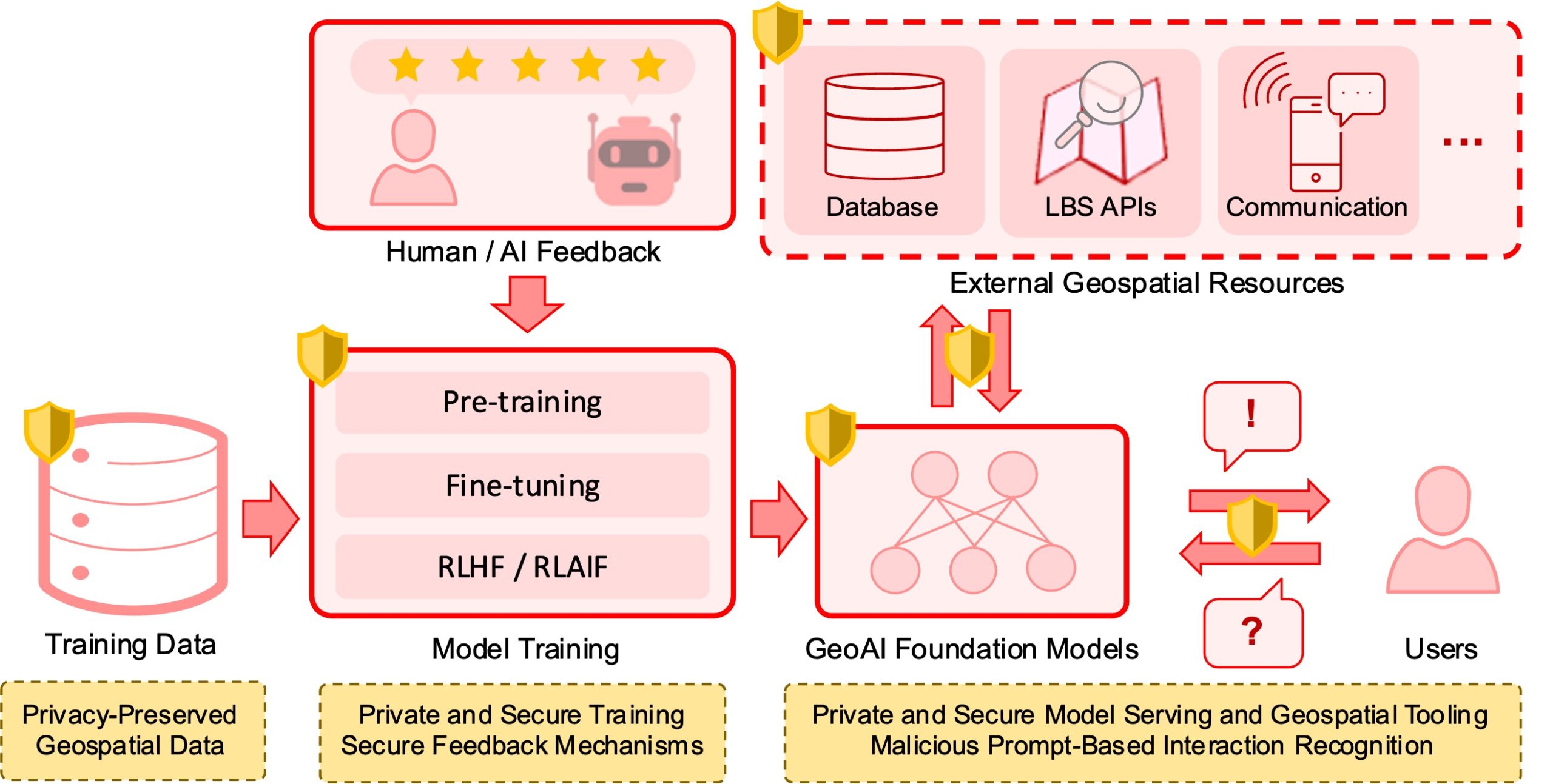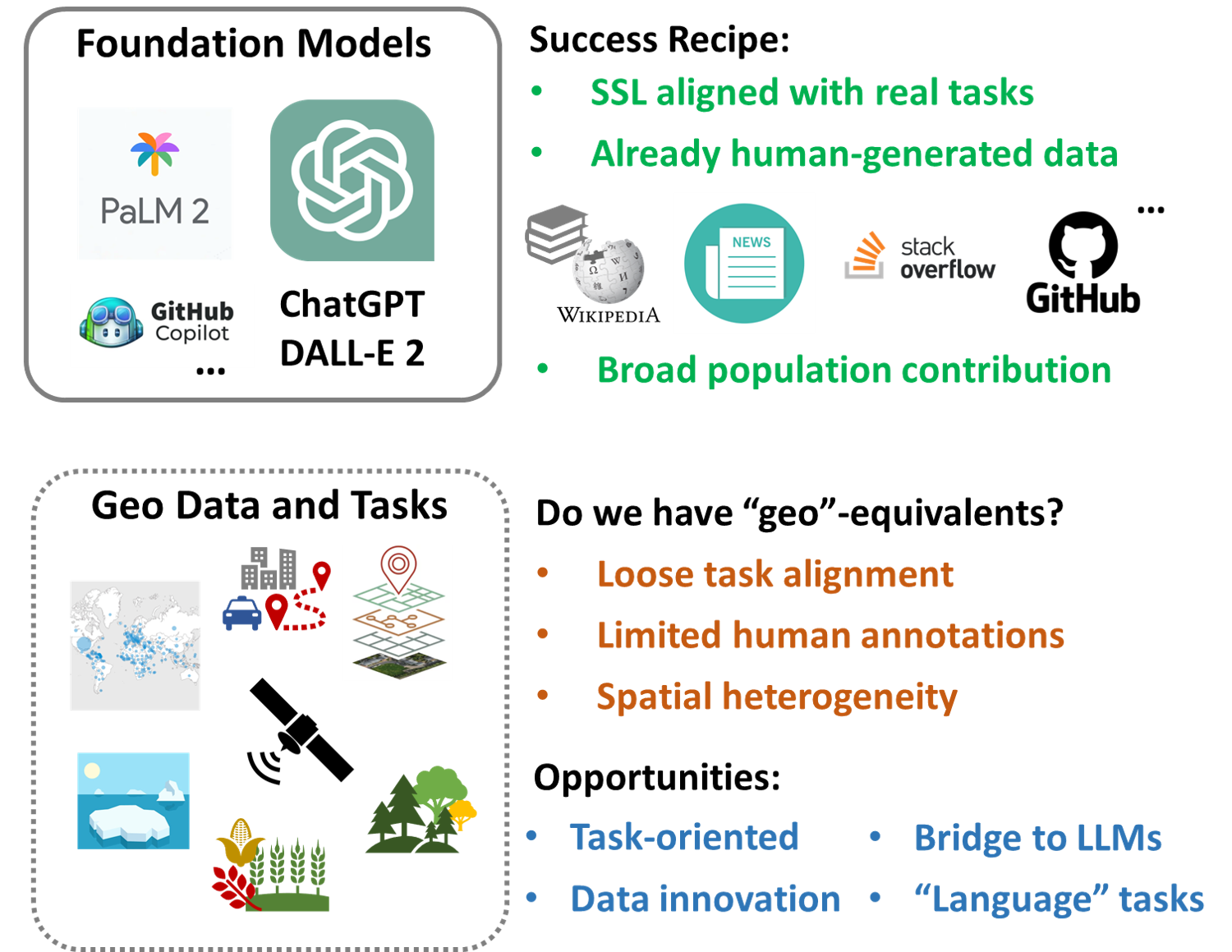Dear colleagues,
We cannot wait to take our AAG 2024 GeoAI Symposium to Hawaii next year! Collaborating with 40+ colleagues across multiple continents, we have put together a series of paper and panel sessions. In the past year, we have been so excited to witness the rapid and continued growth of GeoAI, the advances in its methods and cross-domain applications. This year’s symposium will highlight these advances and will also include critical discussions on the issues of GeoAI and the societal challenges in its use in science and everyday life.
We welcome you to join us to present your papers, co-organize sessions, and serve as a panelist in our symposium. Your participation is key to helping us expand this exciting research community! If you have any questions, please feel free to reach out to the symposium’s lead organizers. The CFP can be found in the attachment.
AAG 2024 GeoAI Symposium organizing team
Lead Organizers:
Wenwen Li, Arizona State University
Yingjie Hu, University at Buffalo
Song Gao, University of Wisconsin, Madison
Budhu Bhaduri, Oak Ridge National Laboratory
Orhun Aydin, Saint Louis University
Shawn Newsam, University of California, Merced
Samantha T. Arundel, United States Geological Survey
Gengchen Mai, University of Georgia
Krzysztof Janowicz, University of Vienna & University of California, Santa Barbara
Sessions (all sessions can be accessed at: https://bit.ly/aag2024geoai):
- GeoAI and Deep Learning Symposium: GeoAI for Science and the Science of GeoAI (Panel discussion session; in-person session; The organizing team)
- GeoAI and Deep Learning Symposium: GeoAI Foundation Models (Panel discussion session; in-person session; The organizing team)
- GeoAI and Deep Learning Symposium: GeoAI for Feature Detection and Recognition (Paper session; In-person session; Contact: Sam Arundel, US Geological Survey; Co-organizer: Wenwen Li, Arizona State University)
- GeoAI and Deep Learning Symposium: GeoAI for Spatial Analytics and Modeling (Paper session; In-person session; Contact: Di Zhu, University of Minnesota; Co-organizers: Guofeng Cao, University of Colorado, Boulder; Song Gao, University of Wisconsin, Madison; Chaogui Kang, China University of GeoSciences)
- GeoAI and Deep Learning Symposium: Emerging Geo-Data Applications in Human Mobility Analysis (Paper session; In-person session; Contact: Xiao Li, University of Oxford; Co-organizers: Xiao Huang, University of Arkansas, Haowen Xu, Oak Ridge National Laboratory, Yuhao Kang, University of South Carolina; Di Zhu, University of Minnesota)
- GeoAI and Deep Learning Symposium: GeoAI for Ecosystem Conservation and and Sustainable Geodesign (Contact: Orhun Aydin, Saint Louis University; Somayeh Dodge, University of California Santa Barbara)
- GeoAI and Deep Learning Symposium: GeoAI for Disaster Resilience I (Paper session; In-person session; Contact Bing Zhou, Texas A&M University. Co-organizers: Lei Zou, Texas A&M University; Yingjie Hu, University at Buffalo; Marcela Suárez, Penn State University, Yi Qiang, University of South Florida; Manzhu Yu, Penn State University; Morteza Karimzadeh, University of Colorado Boulder)
- GeoAI and Deep Learning Symposium: Urban Visual Intelligence (Paper session; In-person session; Contact: Fan Zhang, Peking University, Co-organizer: Yuhao Kang, University of South Carolina; Filip Biljecki, National University of Singapore)
- GeoAI and Deep Learning Symposium: Spatially Explicit Machine Learning and Artificial Intelligence (Paper session; In-person session; Contact: Gengchen Mai, University of Georgia; Co-organizers: Angela Yao, University of Georgia; Yao-Yi Chiang, University of Minnesota-Twin Cities; Krzysztof Janowicz, University of Vienna & UC Santa Barbara; Zhangyu Wang, University of California Santa Barbara; Di Zhu, University of Minnesota-Twin Cities)
- GeoAI and Deep Learning Symposium: GeoAI for Cartography and Mapping (Paper session; In-person session; Contact: Yao-Yi Chiang, University of Minnesota-Twin Cities; Co-organizer: Jina Kim, University of Minnesota)
- GeoAI and Deep Learning Symposium: Responsible GeoAI: Privacy, Fairness, and Interpretability in Spatial Data Science (Paper session; In-person session; Contact: Hongyu Zhang, McGill University; Co-organizers: Yue Lin, University of Chicago; Jinmeng Rao, Mineral Earth Sciences, Alphabet Inc.; Junghwan Kim, Virginia Tech; Song Gao, University of Wisconsin – Madison)
- GeoAI and Deep Learning Symposium: GeoAI for Sustainable and Computational Agriculture (Paper session; In-person session; Contact: Jinmeng Rao, Mineral Earth Sciences, Alphabet Inc.; Co-organizers: Yuchi Ma, Stanford University; Jiahao Fan, University of Wisconsin-Madison; Hongxu Ma, Mineral Earth Sciences, Alphabet Inc.; Gengchen Mai, University of Georgia; Di Zhu, University of Minnesota, Twin Cities)
- GeoAI and Deep Learning Symposium: Human-centered Geospatial Data Science (Paper session; In-person session; Contact: Yuhao Kang, University of South Carolina; Co-organizers: Filip Biljecki, National University of Singapore)
- GeoAI and Deep Learning Symposium: GeoAI and Social Sensing for Human-Pandemic Dynamics (Paper session; In-person session; Contact: Binbin Lin, Texas A&M University, Mingzheng Yang, Texas A&M University; Co-organizers: Lei Zou, Texas A&M University)
- GeoAI and Deep Learning Symposium: GeoHealth Data Science (Paper session; In-person session; Contact: Jiannan Cai, The Chinese University of Hong Kong; Co-organizer: Mei-Po Kwan, The Chinese University of Hong Kong)
- GeoAI and Deep Learning Symposium: AI for Earth Observation (Paper session; In-person session; Contact: Bo Peng, PAII, Ping An U.S. Research Lab ; Co-organizer: Chenxi Lin, PAII, Ping An U.S. Research Lab ; Beth Tellman, University of Arizona; Bandana Kar, U.S. Department of Energy; Lexie Yang, Oak Ridge National Laboratory; Yanghui Kang, University of California, Berkeley; Qunying Huang, University of Wisconsin-Madison; Di Zhu, University of Minnesota, Twin Cities)
- GeoAI and Deep Learning Symposium: Characterization of Place and Human Patterns of Life (Paper session; In-person session; Contact: Junchuan Fan,Oak Ridge National Laboratory; Co-organizer: Joon-Seok Kim, Oak Ridge National Laboratory; Licia Amichi, Oak Ridge National Laboratory)
To present your research in one of these sessions, please register and submit your abstract at https://aag.secure-platform.com/aag2024/. When you receive confirmation of your submission, please forward your confirmation email to the session organizers by Nov. 16, 2023.

